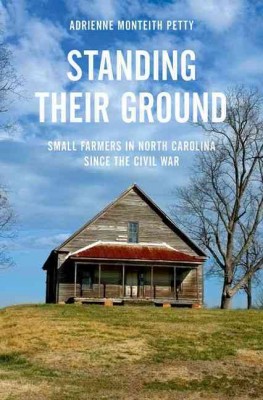| Standing Their Ground: Small Farmers in North Carolina Since the Civil War Contributor(s): Petty, Adrienne Monteith (Author) |
|
 |
ISBN: 0199938520 ISBN-13: 9780199938520 Publisher: OUP Us OUR PRICE: $128.25 Product Type: Hardcover - Other Formats Published: September 2013 |
| Additional Information |
| BISAC Categories: - History | United States - Civil War Period (1850-1877) - History | United States - State & Local - South (al,ar,fl,ga,ky,la,ms,nc,sc,tn,va,wv) - Technology & Engineering | Agriculture - General |
| Dewey: 630.975 |
| LCCN: 2013009335 |
| Physical Information: 1" H x 6.4" W x 9.3" (1.30 lbs) 296 pages |
| Themes: - Chronological Period - 1851-1899 - Topical - Civil War |
| Descriptions, Reviews, Etc. |
| Publisher Description: The transformation of agriculture was one of the most far-reaching developments of the modern era. In analyzing how and why this change took place in the United States, scholars have most often focused on Midwestern family farmers, who experienced the change during the first half of the twentieth century, and southern sharecroppers, swept off the land by forces beyond their control. Departing from the conventional story, this book focuses on small farm owners in North Carolina from the post-Civil War era to the post-Civil Rights era. It reveals that the transformation was more protracted and more contested than historians have understood it to be. Even though the number of farm owners gradually declined over the course of the century, the desire to farm endured among landless farmers, who became landowners during key moments of opportunity. Moreover, this book departs from other studies by considering all farm owners as a single class, rejecting the widespread approach of segregating black farm owners. The violent and restrictive political culture of Jim Crow regime, far from only affecting black farmers, limited the ability of all farmers to resist changes in agriculture. By the 1970s, the vast reduction in the number of small farm owners had simultaneously destroyed a Southern yeomanry that had been the symbol of American democracy since the time of Thomas Jefferson, rolled back gains in landownership that families achieved during the first half century after the Civil War, and remade the rural South from an agrarian society to a site of global agribusiness. |